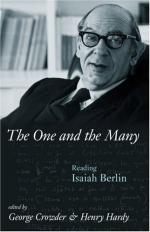|
This section contains 8,170 words (approx. 28 pages at 300 words per page) |

|
SOURCE: “Spinoza on Positive Freedom,” in Political Studies, Vol. XLI, No. 2, June, 1993, pp. 284-98.
In the following excerpt, West summarizes Spinoza's concept of positive freedom in order to refute Berlin's assertion that it is likely to produce coercive systems of government; Berlin's response to West follows.
Isaiah Berlin's influential attack on the positive concept of liberty has set much of the tone for political thought within the liberal tradition. Liberal theorists have echoed the warnings about any account which sees freedom as the expression of the ‘rational’ or ‘true’ self, as the fulfilment of the ‘real’ or ‘authentic’ interests rather than the actual preferences of the agent. By and large these theorists have shared Berlin's fear that by a ‘monstrous impersonation’ a positive notion of freedom would encourage that particularly insidious form of paternalism which views coercion as the essential means to true freedom. Paternalistic coercion forces me...
|
This section contains 8,170 words (approx. 28 pages at 300 words per page) |

|


